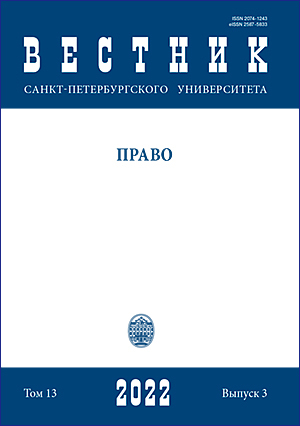Fulfillment of inquiry on extradition of persons for solving criminal case of execution of sentence on the example of post-Soviet countries
DOI:
https://doi.org/10.21638/spbu14.2022.313Abstract
The article deals with topical issues related to executing requests for extraditing a person for the resolution of a criminal case or the execution of a sentence, and analyzes norms of international legal acts and national legislation in post-Soviet countries. The lack of uniformity across post-Soviet countries on this issue is noted, since each post-Soviet country has its own characteristics. Carrying out an extradition is not only one procedural action; it consists of several procedural actions aimed at the actual transfer of the person. This article examines proceedings for the extradition of a person to a foreign state, which traditionally begins with the detention of that person on the international wanted list, a notification to a foreign state about the detention of that person on the international wanted list, and a request to send a request for extradition of that person, the receipt of that request for extradition, and verification of compliance with the request against norms of national legislation and norms of international treaties. Also involves are resolving the extradition of a person to a foreign state with a possible appeal against this decision, organizing a case regarding the actual transfer of a person. The author concludes that there are difficulties executing an extradition request that subsequently leads to non-execution of the request, and delay or refusal to extradite. In this process, the worst result is to import rules on the refusal of extradition without a reasonable assumption and justification for different purposes. In any case, the refusal to extradite people without a substantial reason will not lead to a good outcome: distrust of states can become the basis for damaged relations and non-extraditable persons. Ideas are proposed for improving criminal procedural legislation and law enforcement practice in this area, as well as the effectiveness of actions aimed at resolving this issue.
Keywords:
international cooperation, extradition of persons, inquiry, post-soviet countries, international agreements, criminal procedural legislation, foreign state, criminal case
Downloads
References
Downloads
Published
How to Cite
Issue
Section
License
Articles of "Vestnik of Saint Petersburg University. Law" are open access distributed under the terms of the License Agreement with Saint Petersburg State University, which permits to the authors unrestricted distribution and self-archiving free of charge.






